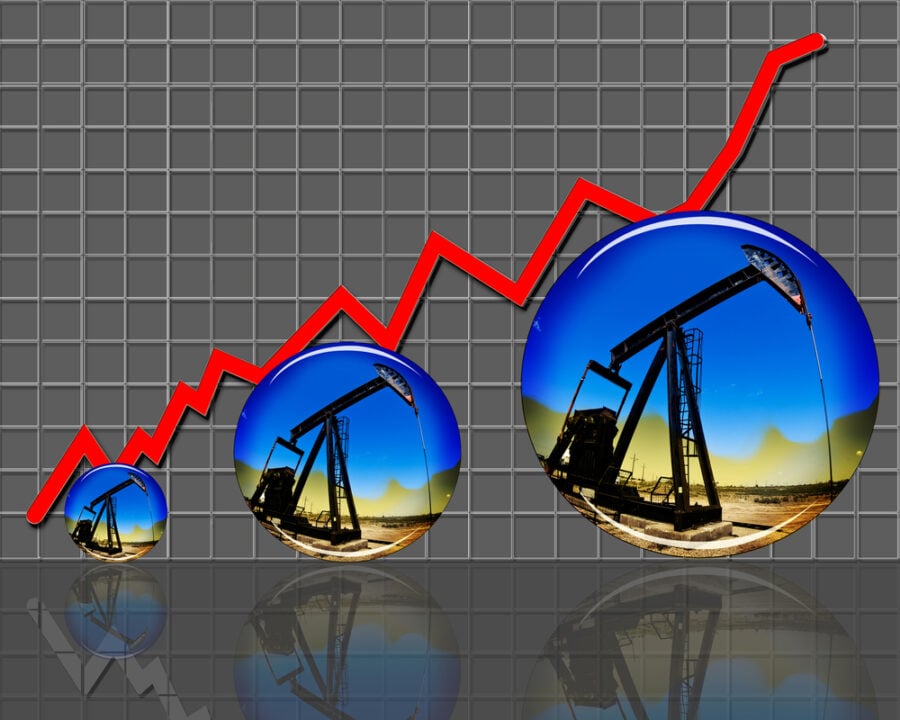Oil prices jumped on Monday, as energy and commodity markets plunged into chaos after Western countries imposed more sanctions to isolate Russia following its invasion of Ukraine. On Monday, the European Union discussed its response to US proposals for the coordinated liberalization of emergency oil reserves to help counter rising prices.
Reuters reported that the price of Brent jumped again above $100 a barrel, initially rising by more than $7, as the nuclear warning and bank payment restrictions heightened fears of possible disruption to oil shipments from the world’s second-largest producer. Russia accounts for about 10 percent of the world’s oil supply.
More financial sanctions
On Saturday, Western countries tightened their financial sanctions on Moscow, excluding many Russian banks from the “SWIFT” system for international financial exchanges, and also took measures aimed at preventing the Russian Central Bank from supporting the national currency by restricting its access to international capital markets.
Japan has said it will also participate in removing selected Russian banks from the SWIFT system, provide humanitarian aid, and seek to identify and freeze assets belonging to Russian President Vladimir Putin and other Russian officials.
The Saudi Crown Prince
Today, Saudi Crown Prince Mohammed bin Salman bin Abdulaziz affirmed, in a call he received from French President Emmanuel Macron, the Kingdom of Saudi Arabia’s keenness on balancing oil markets and its commitment to the “OPEC +” agreement.
According to the official news agency “SPA”, during the call, they discussed bilateral relations between the two countries and opportunities for developing cooperation in various fields, according to the agency. They also discussed the latest regional and international developments and the efforts exerted in their regard, foremost of which is strengthening international peace and security. The contact also discussed the situation in Ukraine and the impact of the crisis on energy markets.
Brussels’ meeting
The call comes as the European Union discusses in Brussels today its response to US proposals for the coordinated liberalization of emergency oil reserves to help counter price hikes following the Russian invasion of Ukraine. Britain, which left the EU, is considering liberating its reserves.
According to a preliminary document by France, which is currently chairing the meetings of EU ministers, the EU ministers at the emergency meeting will “evaluate possible additional measures in relation to protecting supplies, the use of strategic oil reserves, and the management of gas stocks”.
They will also discuss potential assistance to Ukraine’s energy sector, according to the document seen by Reuters. They will consider additional measures to address rising energy prices.
President Joe Biden said last week that he is committed to tapping into the US Strategic Petroleum Reserve if needed, a strategic signal designed to help allay supply concerns.
The International Energy Agency pledged last week to help ensure global energy security. India said it would support initiatives to release emergency oil reserves to help cool prices.
On the other hand, the White House said that imposing energy sanctions on Russia is on the table.
The prices
Brent crude futures rose $4.69, or 4.8 percent, to $102.62 after recording $105.07 a barrel in early trading. The April Brent contract expires on Monday.
Brent crude, April settlement, rose 4.2 percent to $102.06 a barrel on the European ICE Futures Exchange.
Brent crude’s May contract, rose $5.28 to $99.40.
US West Texas Intermediate crude futures rose $5.34, or 5.8 percent, to $96.93 a barrel, after hitting $99.10 a barrel early in the day.
West Texas Intermediate crude rose to as much as $100.54 last week.
Fears of supply disruptions
“Moves by the United States and Europe to write off some Russian banks from the Swift system have raised fears of a supply disruption of some kind in the near term,” said Daniel Haynes, a commodity strategist at ANZ. “The supply risk is the biggest we’ve seen for some time and comes in a tight market,” he added.
Russian President Vladimir Putin raised the stakes on Sunday, ordering Russia’s “deterrence forces” – which have nuclear weapons – on high alert.
“President Putin’s decision to put Russia’s nuclear forces on high alert is a clear and alarming escalation that can only support a rise in oil prices,” said Stephen Brennock of BVM oil brokerage.








